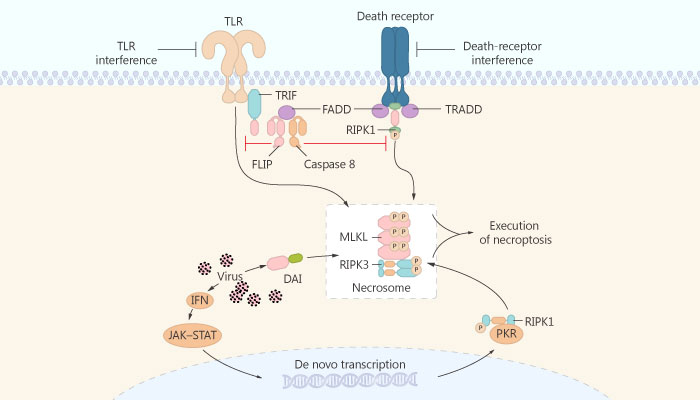Necroptosis is a type of programmed cell death that usually occurs under apoptosis-deficient conditions. Necroptosis plays an important role in many pathological processes such as ischemia-reperfusion injury and host defense against viral infection. Receptor-interacting protein kinase-3 (RIP3, or RIPK3) is a central player in necroptosis, and its kinase activity is essential for downstream necroptotic signaling events. Since RIP3 kinase activity has been associated with various diseases, the development of specific RIP3 inhibitors is an attractive strategy for therapeutic application.

HS-1371 is a novel kinase inhibitor of RIP3-mediated necroptosis. To test the possible effects of the RIP3 inhibitors on necroptosis, HT-29 cells were treated with HS-1371. RIP3 kinase activity was determined by examining its phosphorylation status. It showed an inhibitory effect on S227 auto-phosphorylation of RIP3 at the basal level. Inhibition of RIP3 kinase activity by HS-1371 blocked necrosome complex formation, showing disruption of MLKL recruitment . Then, HT-29 cells are treated with these inhibitors followed by TSZ to induce necroptosis. Only HS-1371 rescued TSZ-induced cell death, similar to DAB, and the reduced cytotoxicity was consistent with western blot data. This shows that this inhibitor effectively blocked RIP3 kinase activity. Post-treatment of it also has an inhibitory effect on RIP3-mediated necroptosis.
HS-1371 binds to the ATP binding pocket of RIP3 and inhibits ATP binding to prevent RIP3 enzymatic activity in vitro. Therefore, the inhibition of RIP3 kinase activity by HS-1371 protects cells from RIP3-mediated necroptosis. This novel RIP3 kinase inhibitor could be used as a therapeutic agent for diseases involving RIP3 hyperactivation.